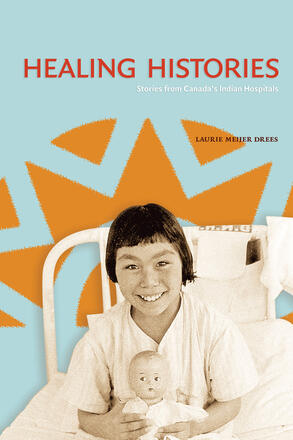
Healing Histories
Stories from Canada's Indian Hospitals
Laurie Meijer Drees collected oral histories from people who experienced tuberculosis in Indigenous communities and the Indian Hospital System.
Description
Healing Histories is the first detailed collection of Aboriginal perspectives on the history of tuberculosis in Canada’s indigenous communities and on the federal government’s Indian Health Services. Featuring oral accounts from patients, families, and workers who experienced Canada’s Indian Hospital system, it presents a fresh perspective on health care history that includes the diverse voices and insights of the many people affected by tuberculosis and its treatment in the mid-twentieth century. This intercultural history models new methodologies and ethics for researching and writing about indigenous Canada based on indigenous understandings of ‘story’ and its critical role in Aboriginal historicity, while moving beyond routine colonial interpretations of victimization, oppression, and cultural destruction. Written for both academic and popular reading audiences, Healing Histories is essential reading for those interested in Canadian Aboriginal history, history of medicine and nursing, and oral history.
Reviews
"College-level audiences as well as any interested in Canada's Native American experiences will find this a scholarly yet accessible read. "
- California Bookwatch
"The impact of boarding schools on aboriginal communities and families is a topic thoroughly analyzed by scholars and collectively remembered by aboriginal peoples. Yet a phenomenon that has also deeply affected the aboriginal community has escaped significant attention from historians: the Indian hospital. One historian, Laurie Meijer Drees, has at last chosen to tackle this topic with the clear and engaging Healing Histories. ... The history Drees provides in each chapter is significant. But perhaps Drees's larger contribution is her use of oral histories. ... [A]n excellent example for scholars--both experienced and prospective alike--of the necessary and proper place of oral histories within the larger field of history. "
- Dylan Huisken
"These accounts are poignant and at times heartbreaking; however, the stories are the primary strength of this book and serve as a model for 'new methodologies and ethics for researching and writing about indigenous peoples. Rather than continue the tired (but true) narrative of aboriginal peoples as victims of colonization and oppression, Meijer Drees emphasizes resilience, perseverance, and adaptability and offers insights into how traditional healing practices, specifically those of Coast Salish peoples, persisted despite Western medical hegemony. This adds color to existing literature by privileging marginalized voices in a social history that goes beyond the usual complex political and administrative history of health care and Native peoples. Highly recommended. " G. Bruyere, CHOICE Magazine, October 2013
"The author examines the roles of tubercular hospitals, primarily Nanaimo Indian Hospital and the Charles Camsell Indian Hospital at Edmonton. Included are stories and interviews both from staff and patients. .. The most serious impediments to recovery were the loneliness of the patients, enforced rest periods, boredom, and a great cultural and language gap between patients and staff. .. As a person who regularly visited the Camsell in the early 1950s, this reviewer can identify with much of what the author writes. " Hugh Dempsey, Alberta History, Summer 2013
"A new book about the trials and tribulations in Indian hospitals is hitting close to home for aboriginals across Canada. Healing Histories chronicles the stories of Indian hospitals in Canada through the eyes of those who lived through it on a daily basis. Laurie Meijer Drees wrote the book to raise awareness on the medical issues facing our Indian population. ...and was inspired to share the story of native hospitals from her mother who previously worked at the Charles Camsell Indian Hospital in Edmonton. She says these stories have a significant connection with the issues in Alberta's native residential schools. " 880 News, April 7, 2013
". ..Healing Histories is a strong addition to any Canadian history collection focusing on relations with first nations peoples. " Wisconsin Bookswatch, April 2013
"Drees's balanced research provides evidence that good and caring work was done by some staff in these hospitals, despite much of it having been premised on assumptions of inferiority and a complete lack of respect for aboriginal culture. . According to Drees, 'the legacy of the authoritarian approaches' can no longer be ignored. . A lot of research remains to be done. Not only on abuses, but on our attitudes to First Nations and their problems. " Gary Geddes, The Victoria Times Colonist, February 24, 2013 [Full article at http://bit. ly/V2F3UR]
“Through interviews with former hospital staff and elders from the Cowichan, Haida, and Snuneymuxw nations (among others), Drees covers hospital conditions, patient experiences and the persistence of traditional healing practices (Snuwuyulth) within institutional contexts. As a social history of Indian Health Services, Healing Histories covers a surprisingly broad range of topics. … Drees’ social history will be useful for scholars and readers working in the fields of Indigenous storytelling, healthcare, and the history of residential schools.”
- Christina Turner